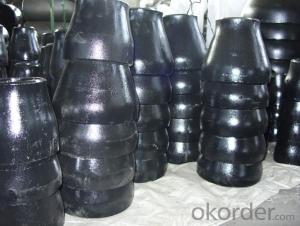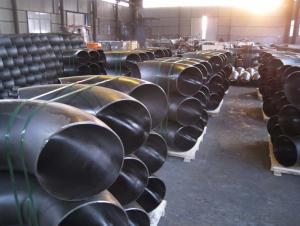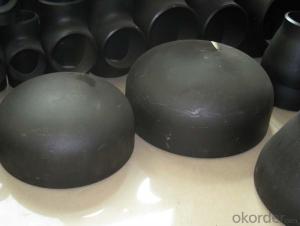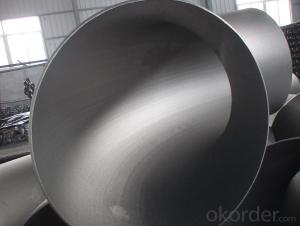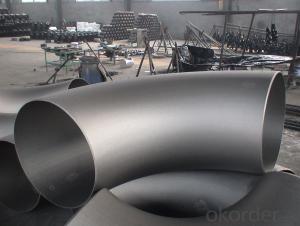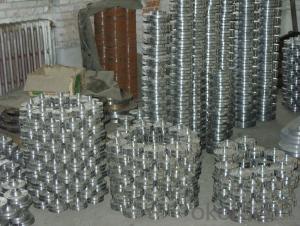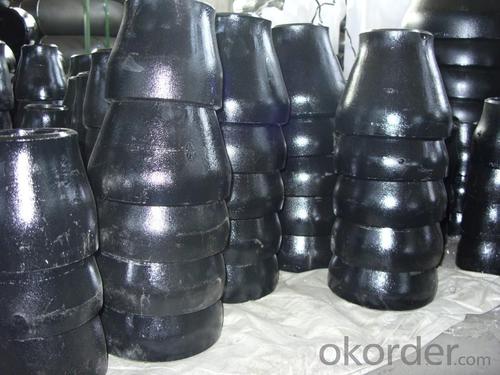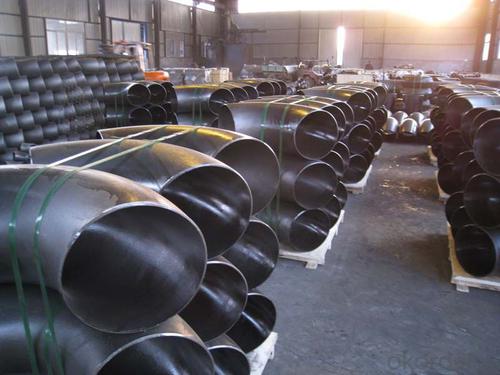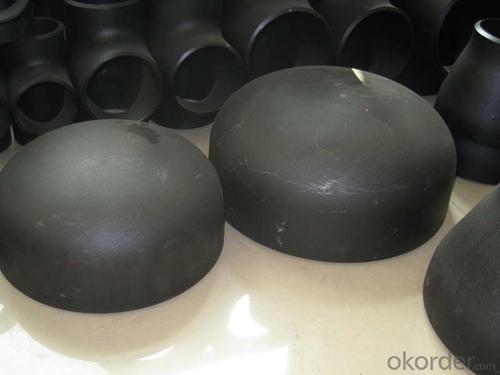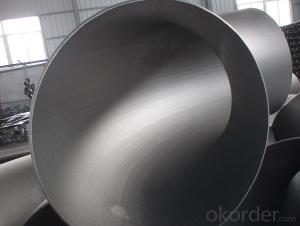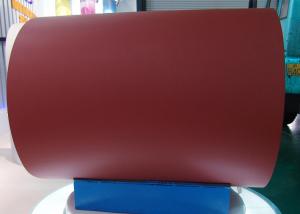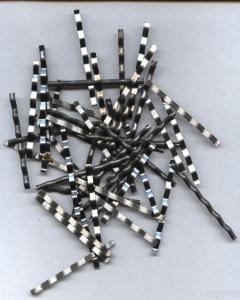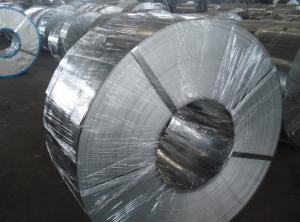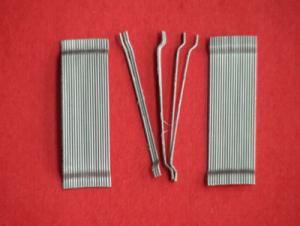Carbon Steel Pipe BEND 90DEG
- Loading Port:
- China Main Port
- Payment Terms:
- TT OR LC
- Min Order Qty:
- -
- Supply Capability:
- -
OKorder Service Pledge
OKorder Financial Service
You Might Also Like
Specifications
pipe fitting elbow
Certificate:ISO:9001-2000
New material,completely meet asme and din standard
Best price
1. type: AISI ASTM A234 WPB BW Con Elbow
2. Size: 1/2"-48"(1/2"-24"is seamless and 26"-48"is welded)
3. Wall thickness: sch10-160, STD, XS, XXS
4. Material: A234WPB, A420WPL6, A420WP5, WP11, WP12, WP22, etc
5. Welding line: seamless
6. Angle of bend: 30, 45, 90, 180degree
7. Bending radius: SR, LR
8. Standard: ANSI B16.9, JIS, SB, DIN, GB
9. Surface treatment: black paint, vanis paint, black rust-proof oil,
transparent oil, hot galvanizing
10. Application: petroleum, electricity, chemical, natural gas, metallurgy,construction,
shipbuilding and other fields because of its high pressure, high temperature, etc
11. connection: welding
12. technics:forged
13.Certificate:ISO9001 - 2000, CE, SGS, etc.
14. packaging: wooden case, pallet, container or in accordance with the
requirement of customers
15. Principle: quality fist, customer first, credit first
16. payment: L/C T/T
17. delivery time: 7-25 days after payments
18. Notes: the bevel can be made in accordance with the special requirements
of the customers
19. Others: we can also produce the products according to the requirements
of the customers
The main production:
1. PIPE FITTINGS: elbows, tees, bends, reducers, cap, flanges and sockets etc.
2. PIPE: bult welded pipes, seamless pipes, threaded pipes, etc.
We sincerely welcom customers at home and abroad to visit us and seek common development.
- Q: How is steel used in the production of marine equipment and vessels?
- Steel is used extensively in the production of marine equipment and vessels due to its strength, durability, and corrosion resistance. It is used to construct the hulls, decks, and superstructures of ships, as well as various components such as propeller shafts, rudders, and bulkheads. Steel's high tensile strength allows for the construction of large, sturdy vessels capable of withstanding harsh marine environments and rough seas. The corrosion resistance properties of steel are crucial in preventing damage from constant exposure to saltwater, ensuring the longevity and reliability of marine equipment and vessels.
- Q: How are steel sheets used in the manufacturing of solar panels?
- Steel sheets are not directly used in the manufacturing of solar panels. Instead, they are often used as structural components in the support structures for solar panels, such as mounting frames or racks. These steel sheets provide a sturdy and durable framework to hold the solar panels in place and ensure their optimal positioning for maximum sunlight exposure.
- Q: What are the different types of steel sheets and their applications?
- There are several different types of steel sheets, each with their own unique properties and applications. Some common types include hot rolled steel sheets, cold rolled steel sheets, galvanized steel sheets, and stainless steel sheets. Hot rolled steel sheets are typically used in construction and manufacturing industries due to their high strength and durability. They are commonly used for structural components, such as beams and columns, as well as for automotive and machinery parts. Cold rolled steel sheets are known for their smooth surface finish and tight dimensional tolerance. They are often used in applications that require precise shapes and sizes, such as appliances, furniture, and automotive body panels. Galvanized steel sheets are coated with a layer of zinc to prevent corrosion and rust. They are commonly used in outdoor structures, such as roofing and siding, as well as in automotive parts and electrical equipment. Stainless steel sheets are highly resistant to corrosion and staining, making them suitable for a wide range of applications. They are commonly used in kitchen appliances, food processing equipment, medical devices, and architectural structures. Overall, the choice of steel sheet depends on the specific requirements of the application, such as strength, finish, corrosion resistance, and cost.
- Q: What are the applications of steel forgings in the aerospace industry?
- Steel forgings are widely used in the aerospace industry for various applications. They are primarily utilized in critical components that require high strength, durability, and resistance to extreme temperatures and pressures. Some common applications include engine parts, landing gear components, structural members, and fasteners. The use of steel forgings ensures the integrity and reliability of these aerospace components, contributing to the overall safety and performance of aircraft.
- Q: How is steel used in the production of agricultural equipment?
- Steel is used in the production of agricultural equipment due to its durability and strength. It is commonly used to manufacture components such as blades, plows, and machinery frames, as well as storage tanks and containers. The properties of steel make it ideal for withstanding the harsh conditions and heavy usage that agricultural equipment typically endures, ensuring longevity and efficiency in farming operations.
- Q: What are the common types of steel products used in the agricultural industry?
- Some common types of steel products used in the agricultural industry include fencing materials, gates, barn structures, agricultural machinery and equipment, irrigation systems, storage tanks, and trailers.
- Q: How are steel pipes used in the transportation of chemicals?
- Steel pipes are commonly used in the transportation of chemicals due to their durability and resistance to corrosion. They provide a safe and efficient means of transporting various types of chemicals, including corrosive substances, acids, and gases. The steel pipes are designed to withstand high pressure and temperature, ensuring the integrity of the chemical transportation process. Additionally, steel pipes can be easily welded and connected, allowing for seamless connections and minimizing the risk of leaks or spills during transportation.
- Q: What are the different types of steel forgings and their applications in the defense industry?
- There are various types of steel forgings used in the defense industry, including carbon steel forgings, alloy steel forgings, and stainless steel forgings. Carbon steel forgings offer excellent strength, toughness, and wear resistance, making them suitable for applications such as weapon components, tanks, and armored vehicles. Alloy steel forgings provide enhanced strength, durability, and corrosion resistance, making them ideal for applications like aircraft landing gear, missile components, and submarine parts. Stainless steel forgings are known for their excellent corrosion resistance and high strength, making them suitable for applications such as naval vessels, submarines, and aircraft components exposed to harsh environments. Overall, steel forgings play a critical role in the defense industry by providing essential components that ensure the reliability and performance of various defense systems and equipment.
- Q: What are the different types of steel bolts and their uses in the construction of power plants?
- There are several types of steel bolts used in the construction of power plants, each with their specific uses. Some common types include structural bolts, anchor bolts, and flange bolts. Structural bolts are typically used for heavy-duty applications and are designed to withstand high loads and provide structural stability. They are used in various areas of power plant construction, such as connecting steel beams, columns, and other structural elements. Anchor bolts are used to secure equipment and machinery to concrete foundations. They provide stability and prevent movement, especially in areas where vibrations or dynamic loads are present. These bolts are essential for securing large turbines, generators, and other equipment in power plants. Flange bolts are specifically designed for joining pipe flanges and other components in piping systems. They have a washer-like flange under the head, which distributes the load and helps prevent leaks. Flange bolts are crucial for maintaining the integrity of pipelines and ensuring the proper functioning of various power plant systems. The choice of steel bolts in power plant construction depends on factors such as the load requirements, environmental conditions, and specific applications. It is essential to select the appropriate type of bolt to ensure the safety, stability, and overall efficiency of power plant structures and systems.
- Q: What are the main factors to consider when selecting steel products for a specific application?
- When selecting steel products for a specific application, the main factors to consider are the required strength and durability, corrosion resistance, formability, cost-effectiveness, and availability of the steel.
Send your message to us
Carbon Steel Pipe BEND 90DEG
- Loading Port:
- China Main Port
- Payment Terms:
- TT OR LC
- Min Order Qty:
- -
- Supply Capability:
- -
OKorder Service Pledge
OKorder Financial Service
Similar products
Hot products
Hot Searches
Related keywords
